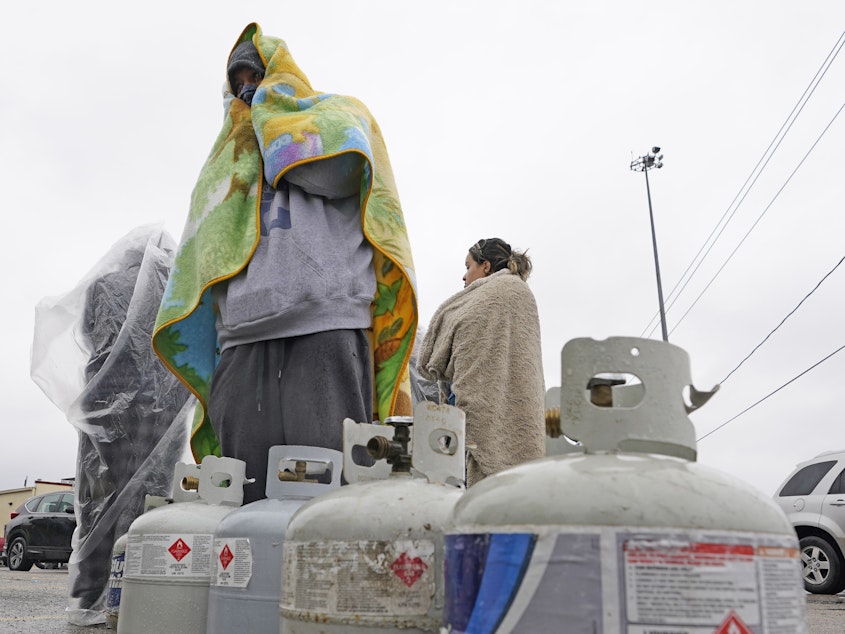'It's Life And Death': Texans Still Without Power As Nation Faces More Winter Storms

Nearly a half-million Texans are without electricity for a third-straight day, as the effects from historic winter storms that have blasted the state and many other parts of the country this week are still being felt.
And more severe weather is ahead for many of the same areas already hit hardest, with 100 million people in the path of the latest storm forecast to bring freezing rain and snow from the Plains to the East Coast on Thursday.
The Electric Reliability Council of Texas, which manages most of the state power grid, said Thursday morning that it had directed Oncor and other energy providers to begin restoring power that had been previously dropped from the grid as part of a series of intentional outages aimed at keeping it from crashing. But there were still about 494,000 power outages in Texas as of early Thursday, with roughly 124,000 other people without power in Louisiana and almost 182,000 in Mississippi, according to the tracking site PowerOutage.US.
Some 7 million residents of Houston, Arlington, Fort Worth and Tyler have been ordered to boil their drinking water after the outages knocked treatment plants offline. Statewide, water pressure has fallen because of frozen lines, Toby Baker, executive director of the Texas Commission on Environmental Quality said.
Speaking to NPR's Morning Edition on Thursday, the mayor of Mansfield, Texas, Michael Evans, described the crisis in the state as "life or death."
"We have been caught in the middle of something here where there have been individuals who have not had electricity or power for about three and a half days now [and] it's zero degrees," Evans said of Mansfield, a suburb in the Dallas-Fort Worth area.
He said neighbors and churches have pitched in to try to help out people whose homes have no electricity, despite concern over the ongoing COVID-19 pandemic.
"I was talking with a family yesterday, and they just knew these people, the temperature in their home was 32 degrees," Evans said. "So what they did was they brought the people in, and they all had their masks and gloves on and the individuals in one side of the house while they were on the other side of the house."
Texas Gov. Greg Abbott, speaking Wednesday in the capital, Austin, called on top executives at the state's grid operator to resign over the outages. "Every source of power the state of Texas has access to has been compromised because of the ultra-cold temperature or because of the equipment failures," he said.
Nationwide, more than 30 deaths have been blamed on the weather this week — some who died trying to stay warm in their homes. One family in Houston succumbed to carbon monoxide poisoning from car exhaust in their garage. In another Houston suburb, a grandmother and three of her grandchildren died in a house fire. Although the cause of the fire has yet to be determined, the Houston Chronicle reports that they had been using a fireplace to keep warm after their electricity went out.
The National Weather Service had winter storm warnings in effect in Texas from San Antonio west to the U.S.-Mexico border. Starting on the other side of the state, an unbroken band of warnings also extended for hundreds of miles through northern Louisiana, central Arkansas, parts of Mississippi, Tennessee, Kentucky, North Carolina, Virginia, West Virginia, western Maryland, Pennsylvania and New Jersey.
Heavy snow and ice is expected Thursday in the Appalachians, northern Maryland and southern Pennsylvania, the National Weather Service said.
Meanwhile, in Oregon, where winter weather advisories still cover much of the state, more than 100,000 customers were still without electricity a week after outages began. The Associated Press reports that a Portland supermarket that had been without electricity tossed perishable food into dumpsters, leading to a clash between scavengers and police.
"These are the most dangerous conditions we've ever seen in the history of PGE," said Dale Goodman, director of utility operations at Portland General Electric. He declined to predict when all customers would have power restored, the AP said.
Louisiana Gov. John Bel Edwards Wednesday evening requested a presidential emergency declaration.
In Shreveport, La., local officials were warning residents that it might be Saturday before water service, cut off due to the winter storms, is fully restored. In Lake Charles, in the Louisiana's southwest, Mayor Nic Hunter said Wednesday that water was scarce and that hospitals there might need to transfer patients out.
Arkansas State Police said Wednesday afternoon that there had been 22 weather-related road accidents along a 30-miles stretch of I-40, which runs through Little Rock.
In Lexington, Kentucky, residents complained that with more snow and sleet expected, many side streets had yet to be cleared from earlier this week and attention was likely to shift again to major roads.
"The roads look like they haven't even been touched," resident Stacy Hoskins told WKYT News. "[If] you haven't been out clearing already then you're not going anywhere." [Copyright 2021 NPR]

